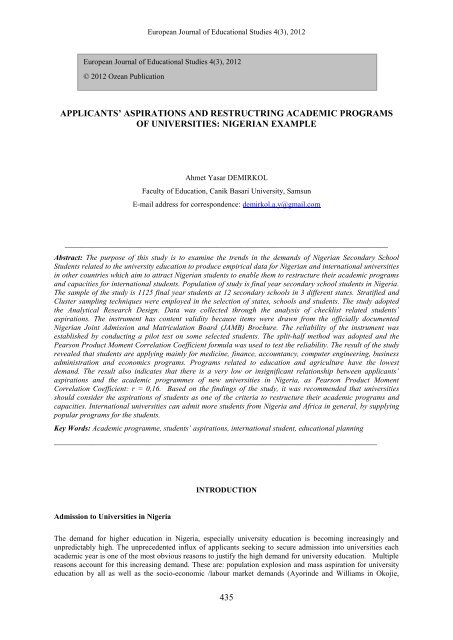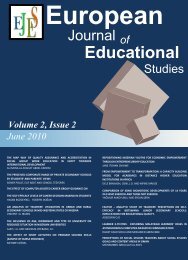Volume 4 Issue 3 (October 2012) - Ozean Publications
Volume 4 Issue 3 (October 2012) - Ozean Publications
Volume 4 Issue 3 (October 2012) - Ozean Publications
Create successful ePaper yourself
Turn your PDF publications into a flip-book with our unique Google optimized e-Paper software.
European Journal of Educational Studies 4(3), <strong>2012</strong><br />
European Journal of Educational Studies 4(3), <strong>2012</strong><br />
© <strong>2012</strong> <strong>Ozean</strong> Publication<br />
APPLICANTS’ ASPIRATIONS AND RESTRUCTRING ACADEMIC PROGRAMS<br />
OF UNIVERSITIES: NIGERIAN EXAMPLE<br />
Ahmet Yasar DEMIRKOL<br />
Faculty of Education, Canik Basari University, Samsun<br />
E-mail address for correspondence: demirkol.a.y@gmail.com<br />
_____________________________________________________________________________________<br />
Abstract: The purpose of this study is to examine the trends in the demands of Nigerian Secondary School<br />
Students related to the university education to produce empirical data for Nigerian and international universities<br />
in other countries which aim to attract Nigerian students to enable them to restructure their academic programs<br />
and capacities for international students. Population of study is final year secondary school students in Nigeria.<br />
The sample of the study is 1125 final year students at 12 secondary schools in 3 different states. Stratified and<br />
Cluster sampling techniques were employed in the selection of states, schools and students. The study adopted<br />
the Analytical Research Design. Data was collected through the analysis of checklist related students’<br />
aspirations. The instrument has content validity because items were drawn from the officially documented<br />
Nigerian Joint Admission and Matriculation Board (JAMB) Brochure. The reliability of the instrument was<br />
established by conducting a pilot test on some selected students. The split-half method was adopted and the<br />
Pearson Product Moment Correlation Coefficient formula was used to test the reliability. The result of the study<br />
revealed that students are applying mainly for medicine, finance, accountancy, computer engineering, business<br />
administration and economics programs. Programs related to education and agriculture have the lowest<br />
demand. The result also indicates that there is a very low or insignificant relationship between applicants’<br />
aspirations and the academic programmes of new universities in Nigeria, as Pearson Product Moment<br />
Correlation Coefficient: r = 0,16. Based on the findings of the study, it was recommended that universities<br />
should consider the aspirations of students as one of the criteria to restructure their academic programs and<br />
capacities. International universities can admit more students from Nigeria and Africa in general, by supplying<br />
popular programs for the students.<br />
Key Words: Academic programme, students’ aspirations, international student, educational planning<br />
_____________________________________________________________________________________<br />
INTRODUCTION<br />
Admission to Universities in Nigeria<br />
The demand for higher education in Nigeria, especially university education is becoming increasingly and<br />
unpredictably high. The unprecedented influx of applicants seeking to secure admission into universities each<br />
academic year is one of the most obvious reasons to justify the high demand for university education. Multiple<br />
reasons account for this increasing demand. These are: population explosion and mass aspiration for university<br />
education by all as well as the socio-economic /labour market demands (Ayorinde and Williams in Okojie,<br />
435

















